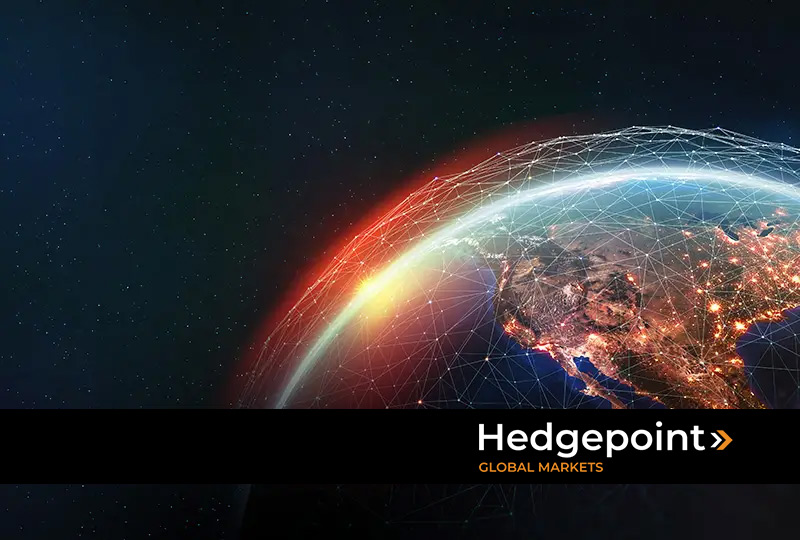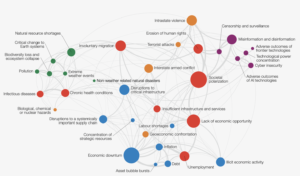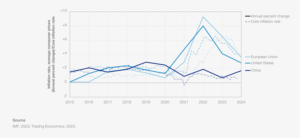
Did you know that market risks refer to possible situations that could result in a lower financial return than expected? This is the reality of transaction

Did you know that market risks refer to possible situations that could result in a lower financial return than expected? This is the reality of transactions involving almost all types of assets, including commodities.
In other words, these risks present the potential for negative results due to changes in the prices and parameters of a given market. In other words, the more volatile an asset is, the more risk-prone it is.
In this sense, the Global Risks Report 2024 provides crucial information. The report covers the most significant risks the world will face in the coming years.
With this in mind, we have created this content for participants in volatile markets, such as agricultural and energy commodities, to reflect on:
Enjoy the reading!
In January, the World Economic Forum released its 19th Global Risks Report 2024. The report exists to raise awareness of the risks facing the planet over a period of 2 to 10 years.
In this edition, the Global Risks Report focuses on discussing technological acceleration, accompanied by uncertainties in the economy. At the same time, it highlights the role of climate and geopolitics. Its aim is to warn of the need to prepare for these risks in order to foster a proactive approach and shape a more stable world.
As such, it is a document that brings together fundamental knowledge to train leaders and market participants about emerging crises. Its importance lies precisely in its ability to provide various insights, as well as reinforcing the need to integrate innovation, collaboration and strategy.
Global risk scenario: an interconnected map

Source: Global Risks Report
Read also:
All aspects that influence the supply and demand of commodities carry the risk of affecting this market and causing changes in prices. We therefore need to pay attention to all the factors that can change this dynamic and have consequences for both producers and consumers.
Below, we have selected 5 main points to keep a close eye on in this sector, based on the Global Risks Report.
Two-thirds of those interviewed by the study pointed to extreme weather conditions as the main risk most likely to trigger a material crisis. The impacts would reach a global scale by 2024.
The warming phase of the El Niño-Southern Oscillation (ENSO) cycle is projected to intensify and persist until May this year. With this, there is the formation of La Niña for the second half of the year. The phenomena could continue to establish new extremes, with heat waves, droughts, forest fires, and floods predicted.
Climate was therefore one of the most critical topics in the report. With varied socio-economic risks, climate challenges can directly impact the planet’s economy and considerably affect agriculture and livestock, for example.
Addressing this issue is fundamental so that actions can be implemented in the markets to avoid more serious consequences even for the planet’s food security.
Read also:
2. Geopolitical conflicts
Power struggles in geopolitics also pose considerable risks, especially due to the escalation of armed conflicts. There is no single cause for this risk, but the report points to three fronts:
Over the next two years, the attention and resources of the global powers will probably be focused on three points. These are: the conflict in Ukraine, the Israel-Hamas conflict and tensions over Taiwan.
Escalation at any of these critical points will radically disrupt global supply chains, financial markets, security dynamics and political stability. These three areas of tension are relevant in the commodities market and involve powers whose interests are concentrated:
Changes in each of these regions could lead to wider regional destabilization, directly attracting the main powers and increasing the scale of the conflict. Therefore, the underlying geopolitical tensions contribute to an unstable global order, characterized by polarized narratives that generate mistrust, insecurity, and volatility.
The short-term outlook is marked by persistent but falling inflation and restrictive interest rates. In addition, there is the scenario of continued supply-side pressures and demand uncertainty.
Small and medium-sized enterprises, along with highly indebted countries, face a greater risk of slowing growth in the context of high-interest rates. Contrary to predictions of a recession in 2023, the global economy has shown unexpected resilience.
Overview – Inflation

However, fears of an economic recession are widespread and persist. In a scenario of slowing world growth, Global Risks indicates that there may be a lack of coherence in future economic projections. This is a short-term outlook for the next two years, given the risks of slower economic expansion in important regions such as the US, Europe, and China.
If price pressures continue, central banks may hesitate to cut rates in response to signs of weaker growth. The result? Possible inflation, with high-interest rates for longer.
Discover the relationship between commodities and inflation
Cyber insecurity ranks 4th in the Global Risks ranking of short-term risks. But in the long term, it is also a concern. After all, cyberattacks have become a reality that affects companies and governments, including in the commodities sector.
As such, they represent a growing risk in today’s digital economy. It is estimated that the costs of cybercrime will reach US$10.5 trillion annually by 2025. This reinforces the need to increase cybersecurity measures in companies.
Allied to this is the proliferation of AI technologies that will reshape society over the next decade. Along with the productivity benefits, advanced AI also brings risks such as disinformation. This is the most serious global risk predicted for the next two years, according to the report.
The spread of false information is likely to widen social and political divisions. According to a study by Oxford University, disinformation campaigns operated by AI can significantly impact public opinion.
It is among the top three short- and medium-term risks. Global Risks ranks political and economic polarization as the 9th greatest long-term risk.
As polarization grows and technological risks remain uncontrolled, social and political polarization will intensify. The effects of this situation could have repercussions on public discourse and governance, with decisions capable of causing volatility and affecting the commodities market.
The world will undergo multiple short- and long-term structural transformations. These include the rise of AI, climate change, a shift in the geopolitical distribution of power and economic uncertainties.
All these structural forces are global, and widespread and have significant impacts. In this context, known and emerging risks require preparation. hEDGEpoint exists to fulfill this role in the agricultural and energy commodities market.
How? We combine market intelligence and sophisticated hedging products. We also have the hEDGEpoint HUB platform to empower the commodities chain, offering reports and updates with analysis of all relevant events.
We thus help protect businesses from volatility and assist in decision-making.
Talk to a hEDGEpoint professional and find out how to turn risks into opportunities.

Rua Funchal, 418, 18º andar - Vila Olímpia São Paulo, SP, Brasil
Contato
(00) 99999-8888 example@mail.com
Section
Home
O que Fazemos
Mercado
Quem Somos
HUB
Blog
Esta página foi preparada pela Hedgepoint Schweiz AG e suas afiliadas (“Hedgepoint”) exclusivamente para fins informativos e instrutivos, sem o objetivo de estabelecer obrigações ou compromissos com terceiros, nem de promover uma oferta ou solicitação de oferta de venda ou compra de quaisquer valores mobiliários, commodity interests ou produtos de investimento.
A Hedgepoint e suas associadas renunciam expressamente a qualquer uso das informações contidas neste documento que direta ou indiretamente resulte em danos ou prejuízos de qualquer natureza. As informações são obtidas de fontes que acreditamos serem confiáveis, mas não garantimos a atualidade ou precisão dessas informações.
O trading de commodity interests, como futuros, opções e swaps, envolve um risco substancial de perda e pode não ser adequado para todos os investidores. Você deve considerar cuidadosamente se esse tipo de negociação é adequado para você, levando em conta sua situação financeira. O desempenho passado não é necessariamente indicativo de resultados futuros. Os clientes devem confiar em seu próprio julgamento independente e/ou consultores antes de realizar qualquer transação.
A Hedgepoint não fornece consultoria jurídica, tributária ou contábil, sendo de sua responsabilidade buscar essas orientações separadamente.
A Hedgepoint Schweiz AG está organizada, constituída e existente sob as leis da Suíça, é afiliada à ARIF, a Associação Romande des Intermédiaires Financiers, que é uma Organização de Autorregulação autorizada pela FINMA. A Hedgepoint Commodities LLC está organizada, constituída e existente sob as leis dos Estados Unidos, sendo autorizada e regulada pela Commodity Futures Trading Commission (CFTC) e é membro da National Futures Association (NFA), atuando como Introducing Broker e Commodity Trading Advisor. A Hedgepoint Global Markets Limited é regulada pela Dubai Financial Services Authority. O conteúdo é direcionado a Clientes Profissionais e não a Clientes de Varejo. A Hedgepoint Global Markets PTE. Ltd está organizada, constituída e existente sob as leis de Singapura, isenta de obter uma licença de serviços financeiros conforme o Segundo Anexo do Securities and Futures (Licensing and Conduct of Business) Act, pela Monetary Authority of Singapore (MAS). A Hedgepoint Global Markets DTVM Ltda. é autorizada e regulada no Brasil pelo Banco Central do Brasil (BCB) e pela Comissão de Valores Mobiliários (CVM). A Hedgepoint Serviços Ltda. está organizada, constituída e existente sob as leis do Brasil. A Hedgepoint Global Markets S.A. está organizada, constituída e existente sob as leis do Uruguai.
Em caso de dúvidas não resolvidas no primeiro contato com o atendimento ao cliente (client.services@hedgepointglobal.com), entre em contato com o canal de ouvidoria interna (ombudsman@hedgepointglobal.com – global ou ouvidoria@hedgepointglobal.com – apenas Brasil) ou ligue para 0800-8788408 (apenas Brasil).
Integridade, ética e transparência são valores que guiam nossa cultura. Para fortalecer ainda mais nossas práticas, a Hedgepoint possui um canal de denúncias para colaboradores e terceiros via e-mail ethicline@hedgepointglobal.com ou pelo formulário Ethic Line – Hedgepoint Global Markets.
Nota de segurança: Todos os contatos com clientes e parceiros são realizados exclusivamente por meio do nosso domínio @hedgepointglobal.com. Não aceite informações, boletos, extratos ou solicitações de outros domínios e preste atenção especial a variações em letras ou grafias, pois podem indicar uma situação fraudulenta.
“Hedgepoint” e o logotipo “Hedgepoint” são marcas de uso exclusivo da Hedgepoint e/ou de suas afiliadas. O uso ou reprodução é proibido, a menos que expressamente autorizado pela HedgePoint.
Além disso, o uso de outras marcas neste documento foi autorizado apenas para fins de identificação. Isso, portanto, não implica quaisquer direitos da HedgePoint sobre essas marcas ou implica endosso, associação ou aprovação pelos proprietários dessas marcas com a Hedgepoint ou suas afiliadas.
aA Hedgepoint Global Markets é correspondente cambial do Ebury Banco de Câmbio, de acordo com a resolução CMN Nº 4.935, DE 29 DE JULHO DE 2021, Artigo 14 do Banco Central do Brasil (BACEN).
Para mais informações sobre nosso parceiro, serviços disponíveis, atendimento e ouvidoria, acesse o link a seguir: https://br.ebury.com/